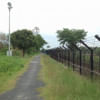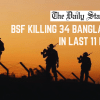Attaining zero target on border killing

Killing of civilians along the Bangladesh-India border by India's Border Security Force (BSF) has plagued the bilateral relations between the two countries for decades. Thus far, the occasional reiteration of the Indian commitment to bring the casualty figure to zero has yielded a marginal result. Needless to say, periodic media reports on border killings and the Indian authorities' reticence about instituting credible investigation into the incidents and actions against the perpetrators have caused frustration among a large section of Bangladeshis.
Last week, the director-general (DG)-level border coordination conference between the BSF and Border Guard Bangladesh (BGB) was concluded in New Delhi. The principal thrust of this conference was to expedite and give more momentum to developmental and infrastructure activities to boost trade and bilateral relations between the two countries. The two forces agreed to curb border crimes effectively through more simultaneous coordinated night patrols in vulnerable regions and real-time sharing of information.
On the issue of "violent incidents" (euphemism for killing) along the border and to ensure that the number of such incidents was curbed, both sides agreed "to work jointly and engage professionally, enhance joint patrolling, and vigilance, especially during late hours of the night to early morning, intensify public awareness programmes, share real-time information and (make) all-out efforts to bring these criminals to justice."
Speaking on the killing incidents at the border, the BSF DG said his force "does not discriminate amongst criminals. So, when these kinds of incidents happen, usually it is taken as a last resort when the life of a BSF personnel on duty is threatened." He asserted that BSF assiduously followed the mandatory policy of resorting to non-lethal weapons. He, however, acknowledged that "in a couple of incidents, the use of force by the BSF personnel was probably more than it was necessary. So, these individuals were identified and the proceedings as per (the) BSF Act are going on." In his statement, the BSF commander stated that the DGs agreed that sometimes there are misunderstandings or misinformation among ground level forces. He hoped by working together the "killing incidents in the bordering area will be reduced."
At the outset of the conference, the BGB DG made it clear that the issue of border killing would be his top priority. However, from the above narrative on the outcome of the conference, it is clear that his Indian counterpart essentially hung on to the business-as-usual approach pursued by his predecessors. No one can underestimate the value of cooperation and collaboration between the border forces of neighbouring countries, and the need for simultaneous coordinated night patrols in vulnerable regions and real-time sharing of information, intensified public awareness programmes and sharing of real-time information. However a close reading of the BSF statement brings to fore several important elements of the Indian approach.
Firstly, the formulation presents the victims of BSF shoot-outs as "criminals." It begs the question whether the BSF as an institution can be the plaintiff, judge, jury and executioner of those deemed by the agency as criminals. Should the determination of criminals not be left to the judicial authorities of the country concerned, following due procedure?
Odhikar documentation reveals that as many as 1,276 Bangladeshi lives were lost and 1,183 more were injured by BSF firing along the Bangladesh-India border between 2010 and March 2023.
Secondly, BSF's claim that it does not discriminate (on grounds of nationality) in shooting down criminals at the border triggers the need for securing the number of Indian nationals who fell victims to such killings over the past 12 years against more than 1,200 Bangladeshis who lost their lives.
Thirdly, the BSF justifies the killing of suspected smugglers by claiming that they try to evade arrest. Suspicion of a crime or evasion of arrest cannot alone justify the use of lethal force. The Human Rights Watch (HRW) and Odhikar report, "Trigger Happy" (2010), reminds us that "even India's domestic laws that allow 'all means necessary' in case a person attempts to use force to resist arrest, specifically forbid causing the death of a person who is not accused of an (offence) punishable by death or a life term." The BSF DG argued that his force used lethal weapons "as a last resort when the life of a BSF personnel on duty is threatened." The hollowness of this argument is well-established. In all 100 cases covered by the HRW and Odhikar study, "the alleged criminals were either unarmed or armed with only sickles, sticks, and knives, which suggest that in shooting victims, the border guards are likely to have used excessive force… In others, injuries indicate the person was shot at close range, with witnesses often alleging that the person was tortured and killed in BSF custody." The report further adds that in none of the cases "did the BSF show it had recovered lethal weapons or explosives that could pose an imminent threat of death or serious injury that might justify killings in (self-defence)." Therefore, the claims that shoot-outs take place for self-defence is simply self-serving.
Fourthly, the BSF DG's statement that "on a couple of incidents, the use of force by the BSF personnel was probably more than it was necessary" is a welcome acknowledgement of the reality. However, in contrast to the "couple of incidents" he cited, Odhikar documentation reveals that as many as 1,276 Bangladeshi lives were lost and 1,183 more were injured by BSF firing along the Bangladesh-India border between 2010 and March 2023.
Fifthly, while the onus of border killing squarely rests on the BSF for its failure to attain zero target set more than a decade ago, the narrative churned out by the agency appears to hold both Bangladesh and India responsible for "misunderstandings and misinformation" that cause "such violence." In the future rounds of the border conference, there is a strong case for Bangladesh to remind the Indian authorities of the zero target that the country has committed to achieve. Also, there is little scope for complacency at the mere "reduction" in the number of killings.
Finally, the DG's assurance that procedures are in place in India for errant BSF personnel to be held to account for their misdeeds fails to gain traction among border scholars and rights activists. The charade conducted in the name of administrative proceedings by the force and the blatant impunity that was accorded to the killers of Bangladeshi teenager Felani leaves little room to trust such a process.
It is worthwhile to juxtapose the experiences of the Indian authorities' border policy along the Bangladesh-India border with those along the India-Pakistan and India-Nepal borders. Unlike the experiences of the other two borders where BSF shoot-outs are rare, if not non-existent, Bangladeshis succumbing to BSF bullets is almost a regular phenomenon. In March 2017, the killing of a Nepalese citizen over a local dispute in a rare shooting at the border prompted a series of anti-India protests in Nepal. The scale of the protest led to India's national security adviser calling up the Nepal prime minister to condole the victim's death and extend assurance that the Indian authorities had initiated a probe into the killing. This leads to the questions why, as a neighbour, we have been taken for granted and being subjected to such brutality and ignominy for decades by India, and why as a nation we have failed to raise our collective voice when our fellow citizens are extrajudicially killed and the perpetrators are not held to account.
Dr CR Abrar is an academic with an interest in human rights issues.

 For all latest news, follow The Daily Star's Google News channel.
For all latest news, follow The Daily Star's Google News channel. 









Comments